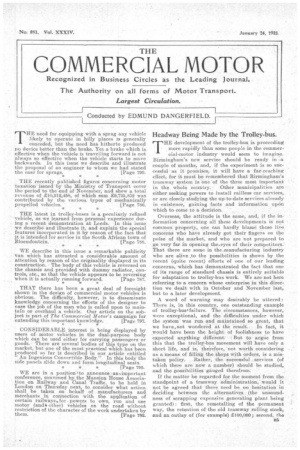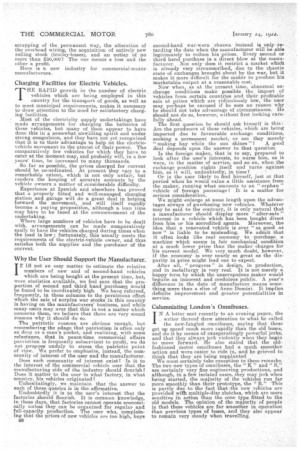Headway Being Made by the Trolley-bus.
Page 1

Page 2

If you've noticed an error in this article please click here to report it so we can fix it.
THE development of the trolley-bue is proceeding ' more rapidly than some people in the commereial-motor industry would seem to imagine. Birininghards new service should be ready in ..a couple Of Months, and,if the experiment is so successful; as it prorniaes, it will have a far-reaching effect, for it must be remembered that Birmingham's tramway system is one of the three most important in the whole country. Other municipalities areeither seeking powers to install railless car services, or are closely studying the up-teedate services already in existence, gaining facts and information up6ii which to come to a decision. .
Overseas, the attitude is the same, and, if the. in formation Concerning all these developments ii not ..
common property, one can hardly blame those live ,
concerns Who have already got ;their fingers on the pulse of the market, and who are not prepared to go:very far in opening the.eyes of their conipetitors.That there are some in the,rnanufaeturing industrywho are alive to the possibilities is shown by the recent (quite recent) efforts of one of our leading concerns, -which has dernonstrated the fact that one of its range of standard chassis is entirely suitable for adaptation to tro]ley-bus work. We are not here referring to-a, concern whose enterprise-in this directionwe dealt with in October and November last, but to a later development.
A word of warning may desirably be uttered : There is, in this country, one outstanding example of trolley-hue failure. The circumstances, however, were exceptional, and the difficulties under which the system was run. and maintained so great, that
we have,not wonderd-at the resnit. In fact, it
would have been the height Of foolishness to have • expected anything di-Greet: But to argue from
this that the trolley-bus movement *ill have only a short life, and .is, therefore, not worth, considering as a means of filling. the -shops with orders, is a mis taken policy. .Rather, .t.htt :4i.ie.P!•s10 , seevices (of which there areno* a number) .should be studied, and the possibilities gauge4 therefrom: '.
. .
If the matter be regarded for the moment from the standpoint of a tramway administration, *Mild it not.be agreed that there need he no hesitation in deciding between the aiternativ0 (the unsoundness of scrapping expensive generating plant being granted): first, the reinetalling of the Permanent way, the retention of the old tramway rolling stock, and an outlay of (for example) £100,000; second, the
scrapping of the permanent way, the alteration of the overhead wiring, the acquisition of entirely new rolling stock (trolley-buses), and an outlay of no more than E50,000? The one means a loss and the other a profit.. Here is a new industry for commercial-motor manufacturers.
Charging Facilities for Electric Vehicles.
THE RAPID growth in the number of electric vehicles which are being employed in this country for the transport of goods, as well as to meet municipal requirements, makes it necessary to draw attention to the need for satisfactory charging facilities. Most of the electricity supply undertakings have made arrangements for charging the batteries of these vehicles, but many of them appear to have done this in a somewhat unwilling spirit and under strong compulsion, and they have not yet recognized that it is to their advantage to help on the electricvehicle movement to the utmost of their power. The comparatively few vehicles for which they have to cater at the moment may, and probably will, in a few' years' time, be increased to many thousands.
So far as possible, the prices charged for current .should he co-ordinated. At present they vary to a remarkable extent, which is not only unfair, but renders the keeping of accurate accounts by the vehicle owners a matter of considerable difficulty. Experience at Ipswich and elsewhere has proved that a properly fitted and well-managed charging station and garage will do a great deal in helping forward the movement, and will itself rapidly become a paying preposition, although a lean time may have to be faced at the commencement of the undertaking. Where large numbers of vehicles have to be dealt with, arrangements can be made comparatively easily to have the vehicles charged during times when the load is low ; fortunately, this usually meets the requirements of the electric-vehicle owner, and thus satisfies both the supplier and the purchaser of the current.
Why the User Should Support the Manufacturer.
Ir IS not an easy matter to estimate the relative numbers of new and of second-hand vehicles which are being bought at the present time, but, were statistics available, we feel sure that the proportion of second and third hand purchases would be found to be inordinately high. We have referred, frequently, in these eolumns to the pernicious effect which the sale of surplus war stocks in this country is having on the manufacturers' business, and white many users may aver that this is net a matter which concerns them, we believe that there are very sound reasons why it should do so. The patriotic reasons are obvious enough, but remembering the adage that patriotism is often only as deep as a man's pocket, and realizing, with some reluctance, that in peace-time commercial affairs patriotism is frequently subservient to profit, we do not propose unduly to stress the patriotic point of view. We prefer to emphasize, instead, the community of interest of the user and the manufacturer.
Does such community of interest exist? Is it to the interest of the commercial vehicle user that the manufacturing side of the industry should flourish? Does it matter to the user in what 'factory, in what country, his vehicles originated? Unhesitatingly, we maintain that the answer to each of these-queries is in the affirmative. Undoubtedly it is to the user's interest that the factories should flourish. It is common knowledge, in these days, that factories cannot operate economically unless they can be organized for regular and full-capacity production. The user who, complaining that the prices of new vehicles are too high, buys B6 second-hand war-worn chassis instead is only retarding the date when the manufacturer will be able legitimately to reduce his prices. Every second or third hand purchase is a direct blow at the manufacturer. Not only does it restrict a market which is already very circumscribed, due to the chaotic state of exchanges brought about by the war, but it makes it more difficult for the maker to produce his marketable output at a reasonable cost. Now when, as at the present time, abnormal exchange conditions make possible the impart of vehicles from certain countries and their profitable sale at prices which are ridiculously low, the user may perhaps be excused if he sees no reason why he should not take advantage of circumstances. He should not do so, however, without first looking care fully ahead. . The first question he should ask himself is this: Are the producers of these vehicles, which are being imported due to favourable exchange conditions, seeking a permanent market, or are they merely " making hay while the sun shines "? A good deal depends upon the answer to that question. Is the foreign maker, that is to say, prepared to look after the user's interests, to nurse him, as it were, in the matter of service, and so on, when the exchange position rights itself and turns against him, as it will, undoubtedly, in time?
Or is the sums' likely to find himself,. just at that period when he would value a little assistance from the maker, running what amounts to an " orphan " vehicle of foreign parentage ? It is a matter for serious consideration.
We might enlarge at some length upon the advantages always of purchasing new vehicles. Whatever may be said to the contrary, it is only natural that a. manufacturer should display more " after-sale" interest in a vehicle which has been bought direct from him or his accredited agents. Moreover, the idea that a renovated vehicle is ever "as good as new" is liable to be misleading. We admit that it often looks like real economy to purchase a machine which seems in fair mechanical condition at a much lower price than the maker charges for his current model. We very much doubt, however, if the economy ia ever nearly so great as the disparity in 'price might lead one to expect. After all, "progress in design, in production, and in metallurgy is very real. It is not merely a happy term by which the unscrupulous maker would beguile an innocent and credulous public. A year's difference in the date of manufacture means something mere than a slice of Anno Doinini. It implies definite improvement and greater potentialities in service.
Calumniating London's Omnibuses.
IN A letter sent recently to an evening paper, the , writer thereof drew attention to what he called the new-fang-led omnibuses, saying that these get lip speed much more rapidly than the old buses, and do it by means of exasperatingly powerful jerks, and that they always jerk violently when they begin to move forward. He also stated that the oldfashioned motor omnibuses had a much smoother action and were easier to ride in, and he grieved to think that they are being supplanted We must certainly take exception to these remarks. The two new types of omnibuses, the " K " and" 8," are oertainly very fine engineering productions, and although, in a few isolated case% they may jerk when being started, the majority of the vehicles run far more smoothly than their prototype, the "B." This is partly due to the fact that tee new vehicles are provided wiih multiple-disc clutches which are more sensitive in action than the cone type fitted to the old models. The opinion of the Inalority of people is that these vehicles are far smoother in operation than previous types of buses, and they also appear to remain very steady when travelling.






























